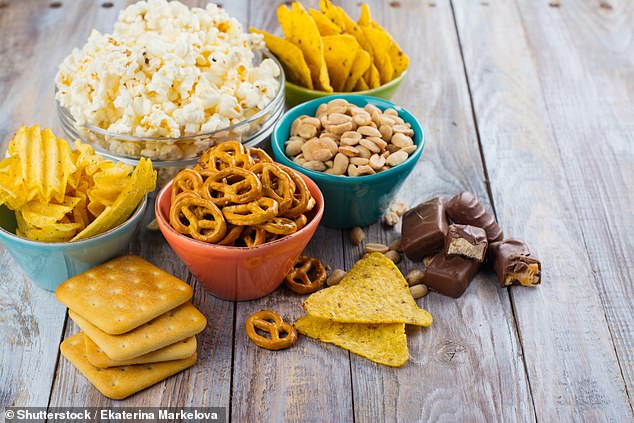Toddlers who eat too much ultra-processed food are almost 20 per cent more likely to be overweight or obese, a study has found.
Eaten when a boy is aged three, these kinds of products were linked to obesity by the time the child reached five.
However, the UPFs did not increase the risk of obesity for girls of the same age. The research looked at 2,217 toddlers, whose parents were questioned about their diet.
UPFs made up 45 per cent of their daily calorie intake, with biscuits, sweets, breakfast cereals and chicken nuggets among the most popular products.
If the average male toddler increased their daily calorie intake by 10 per cent through eating UPFs, they had a 19 per cent greater risk of being overweight or obese by the age of five, the study found.
This could result from simply eating an extra bar of chocolate each day.
The study was carried out in Canada but the proportion of UPFs in the toddlers’ diet is similar to that of children in the UK.
Study author Dr Kozeta Miliku said: ‘It is alarming to see this association between young children’s consumption of ultra-processed food and an increased risk of obesity at such an early age.


‘This matters because children living with obesity tend to become adults also living with obesity and they may have a greater risk of medical problems like high blood pressure and type 2 diabetes as a result.’
UPFs, such as sugary breakfast cereals and frozen chips, are commonly made with artificial ingredients like emulsifiers, which prevent water and oil from separating within the foods, and preservatives.
As to why UPFs increase the risk of obesity in males, researchers suspect that additives may change the bacteria composition in their gut.
However, these suspicions are based on limited studies so scientists caution that more research is needed.
Fellow researcher Dr Howard Chen, from the University of Toronto, said: ‘We need more studies on gut bacteria in children to understand the potential mechanisms between UPFs and the development of obesity.’
The scientists are now calling for increased warnings about UPFs, similar to the ‘traffic light’ labels on food packaging which give nutritional information.
Dr Miliku, who has a three-year-old child, told journal JAMA Network Open: ‘We really need to do more to tackle the diet of our little ones, which could include clearly labelling the degree to which foods are processed and their nutritional quality.
‘UPFs are very accessible and a handy solution for busy days. We are all doing our best to make sure our children are fed, but there are opportunities for us to improve their diet.’

